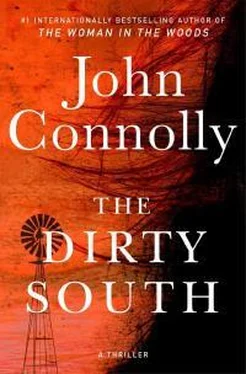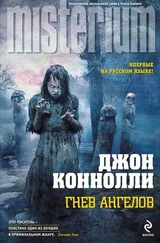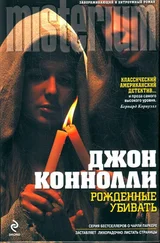But Denny Rhinehart had kept these opinions to himself, making only a token objection – and offering a token concession – to what he was assured would be a temporary measure. Once Kovas had broken ground on the first site, these voluntary restrictions could be dispensed with and normal service resumed. Anyway, it wasn’t as though he made a whole lot of money before noon. Sometimes it was barely worth opening the place just to serve a dozen beers and a couple of drinks from the well, and even then he had to offer free bacon. But Rhinehart didn’t like being told what to do, especially not by the kind of speaking-in-tongues fanatics who comprised the worst of the county’s God-fearers, and had more influence on the susceptible than was conducive to easy living. Rhinehart had parted ways with organized religion many years earlier, and with any notion of God not long after. A man had only to gaze on the havoc wreaked on the state by January’s tornadoes, or take in the slow withering of Burdon County and its people, to come to the conclusion that if there ever was a God, He was long gone from these parts.
So Rhinehart wasn’t greatly pleased when, shortly after 11.30 a.m., Reverend Nathan Pettle entered the bar through the rear door, looking about as uncomfortable as he probably felt, if not more so, Pettle not being a drinking man. Rhinehart and Pettle, like most citizens of stature in Cargill, were on nodding terms with each other, but hadn’t exchanged a word since the meeting convened four months earlier to discuss opening hours.
‘Reverend,’ said Rhinehart. ‘You’re an unlikely visitor. I hope you parked out back, where none of your congregation are likely to see your vehicle and speculate on your vices.’
He grinned, but Pettle didn’t grin back.
‘I was hoping to speak with you for a few minutes, Mr Rhinehart.’
There were many residents of Cargill with whom Denny Rhinehart would have preferred not to spend time in colloquy, and Reverend Pettle figured high among them. Whatever had brought the preacher to his door, it wasn’t going to lead to an increase in Rhinehart’s takings, and might even require him to listen to a sermon.
‘To tell you the truth,’ said Rhinehart, ‘I came in early to get my paperwork done while things were quiet. If there was a way we could do this another time—’
‘I think we should talk now,’ said Pettle. ‘It’s about Donna Lee.’
Tilon Ward, the bag of clothing and toiletries slung over his shoulder, trudged through the woods, Pruitt Dix following close behind. Randall Butcher operated three meth cookhouses out here in the Ouachita, the two smaller ones in converted RVs for reasons of convenience and mobility, and the largest in a house that once belonged to a family called Buttrell, although the last of them was set to fertilizing daffodils in 1989. The dwelling subsequently fell into disrepair, and would in all likelihood have been swallowed up by the forest and eventually forgotten, had the body of Estella Jackson not been discovered in the woodshed close to the main house. Such limited appeal as the property might have offered to most prospective buyers immediately turned to smoke after the killing, and nobody thought much about it when a company in Little Rock acquired the Buttrell acreage at a bargain price and commenced planting pine. The more optimistic townsfolk theorized that the company might even make a profit on its investment down the line, although others took the view that it was some kind of tax write-off, because the Buttrell land was hard to access and any tree farming or logging would require construction of a better road.
As for the families residing on the adjacent land, they had long since ceased to take an interest in what went on there, any inquisitiveness they might once have entertained having evaporated following a single visit from Pruitt Dix – although the threat of the stick was balanced with a carrot in the form of an envelope of cash delivered twice yearly, the Thanksgiving payment being slightly larger than the summer one in recognition of the additional demands the season placed on the pockets of the poor.
Now, as Tilon passed through the rising pines, the house became visible, the two RVs already parked in the yard and a handful of men moving between them. Usually Butcher kept the mobile labs away from the Buttrell land, but not this time. He had buyers lined up, and they’d take all the product he could provide. It made sense to bring the three arms of his operation together in one location, which would save on manpower and costs.
Tilon paused. There, to the right, stood the woodshed in which Estella Jackson had died. Out of whatever impulse – simple perversity, most likely – Butcher had insisted on leaving it intact. Pruitt Dix sometimes slept there if he was obliged to spend the night at the property. Dix didn’t like sharing intimate space with other people. He preferred to cohabit with the dead rather than the living.
As for Tilon, the Buttrell place still gave him the creeps. Whenever possible, he worked out of the RVs, and when he had to go to the house, he tried to leave before dark.
Dix arrived at his side and patted him on the back.
‘Home sweet home.’
68
Parker was already gone from Hamill when a red Nissan appeared in his rearview mirror, flashing its headlights. He couldn’t see the driver clearly because of the sunlight on the windshield, but he pulled over nonetheless, even as his right hand found the butt of the gun under his jacket. He watched as the door of the Nissan opened and a young man stepped out: Nealus Cade, Jurel’s younger brother. Parker released his grip on his weapon and rolled down a window.
‘Mr Cade,’ he said. ‘Can I help you with something?’
Nealus Cade buried his hands deep in the pockets of his jeans and looked back at his car. It was a 240SX, a relatively cheap coupe that gave a lot of bang for the buck.
‘I wanted to speak with you.’
‘Speak away.’
‘Not here.’ He indicated his car. ‘I’m afraid someone might notice us.’
‘If you didn’t want to be noticed, you should have chosen a less ostentatious mode of transportation.’
‘That’s what my father says.’
Nealus was in his early twenties, but he still resembled a teenager, perhaps as a consequence of growing up in the shadow of his siblings, and of Pappy Cade. Yet the young man had a certain strength of character, judging by the care he was said to have extended to his mother in her final illness. It might have been better for him had he found a way to leave Burdon County after she died, because he now appeared to be trapped in a new cycle of dependency with his progenitor.
‘He might have had a point,’ said Parker. ‘Hard to stay under the radar in a car like that.’
‘I have a Dodge too, but it’s in the shop. Seriously, I’d prefer not to be seen talking to you by the side of the road.’
‘Do you have an alternative in mind?’
‘There’s a diner in Fordham, about five miles east of here, just over the county line. It’s called the Dairy Bell. How about I meet you there?’
Parker checked his watch. He wanted to return to Cargill, but he could probably spare the time.
‘I can do that,’ he said.
‘Great,’ said Nealus. ‘I know I sound paranoid, but give me some time to get ahead of you, okay?’
‘Mr Cade,’ said Parker, ‘in case you hadn’t noticed, I’m driving a rental Taurus. I doubt I could keep up with you if I tried.’
Denny Rhinehart made a pot of coffee and filled two cups from it. He and Pettle sat at a table in the dimness of the bar, the Rhine Heart’s windows bearing shutters on the inside that the proprietor kept closed when he wasn’t accepting customers. Now, with the doors locked front and back, they served to offer the two men complete privacy. The radio was playing in Rhinehart’s back office: KKPT out of Little Rock, one of only two classic rock stations the device was able to pick up. Nobody was ever permitted to change the station for fear it might never be located again, thereby leaving Rhinehart to subsist on a diet of Christian Contemporary, Gospel, and Regional Mexican, until he eventually blew his brains out.
Читать дальше












